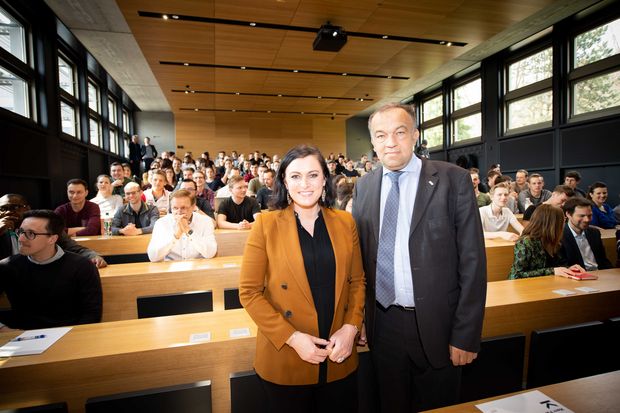Austrian Federal Minister Elisabeth Köstinger sat down with JKU students to discuss the use of plastics.

Elisabeth Köstinger, Austrian Federal Minister for Sustainability and Tourism, held a discussion at Johannes Kepler University Linz together with JKU Rector Meinhard Lukas and Reinhold Lang, head of the Institute for Polymeric Material and Testing, about banning plastic bags, reducing plastic packaging, and how the JKU can contribute to the EU’s sustainability goals.
How can plastic be used sustainably? The discussion focused on this issue, including input by Federal Minister Köstinger and JKU Professor Reinhold Lang together with JKU students.
Banning Plastic Bags
Minister Köstinger remarked that it is vital to create a circular economy in which renewable energies play a key role. When it comes to protecting the environment, banning plastic bags would be a milestone and Austria would be the third EU country to implement a total ban on plastic bags. Although a sustainable circular economy cannot be achieved simply by reducing the use of plastic, the future could also include measures such as using paper bags more often and using them over again. Minister Köstinger added that in addition to banning plastic bags, the federal government plans to reduce plastic packaging by 20-25% to avoid over 60,000 tons of plastic waste. A few weeks ago, the majority of the EU parliament adopted the “Single Use Plastics Directive”.
From the Industrial Revolution to a Circular Economy
Professor Reinhold Lang (Institute for Polymeric Material and Testing, JKU) then offered four theses to the discussion of plastic and on sustainability: Plastic waste is an expression of a dysfunctional economic system that is based on conventional approaches stemming from the industrial revolution. In this case, we have to re-think and consistently reduce / minimize the material and energy intensity for each product respectively using renewable energy resources. This kind of circular economy is not, however, automatically sustainable from the get-go and here, too, we have to pay attention to eco-efficiency and take already occurring changes in the energy system towards renewable energies into account. Only then could a sustainable circular economy become a ‘game changer’.
In lieu of the major social challenges, such as the UN’s Sustainable Development Goals of the 2030 Agenda, the UN Climate Change Agreement in Paris to reduce greenhouse gasses and the UE initiative towards a Circular Economy, the Johannes Kepler University Linz has included three university-wide priorities in its 2019-2024 Development Plan, such as “Sustainable Development: Responsible Technologies und Management (JKUsustain)”. The department of polymer engineering at the JKU will make important contributions and emphasize these areas at the JKU as there is an exceptionally strong industrial environment in Upper Austria – even in an international comparison. Prof. Lang added that plastics are and will remain a material of the future. In this regard, engineering degree programs at the JKU have been expanded to include areas of “sustainable development”, “recycling”, and “all-circular carbon economy”.








